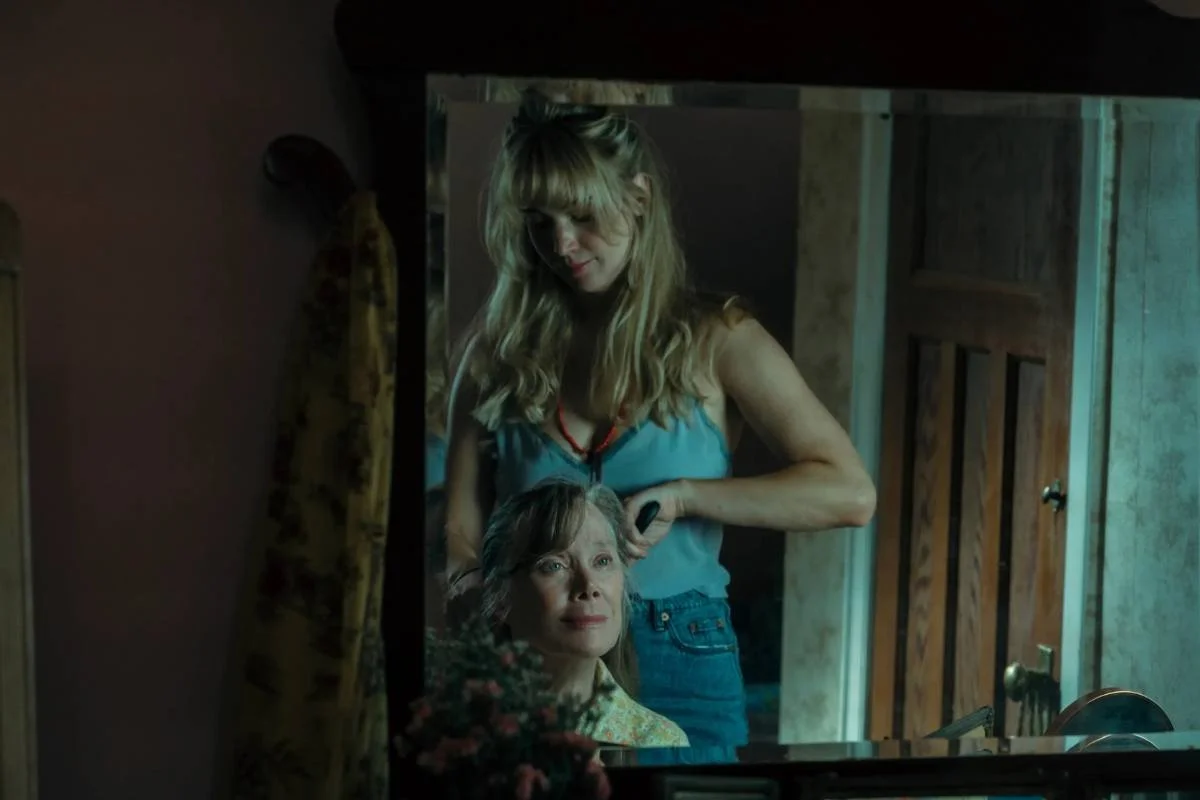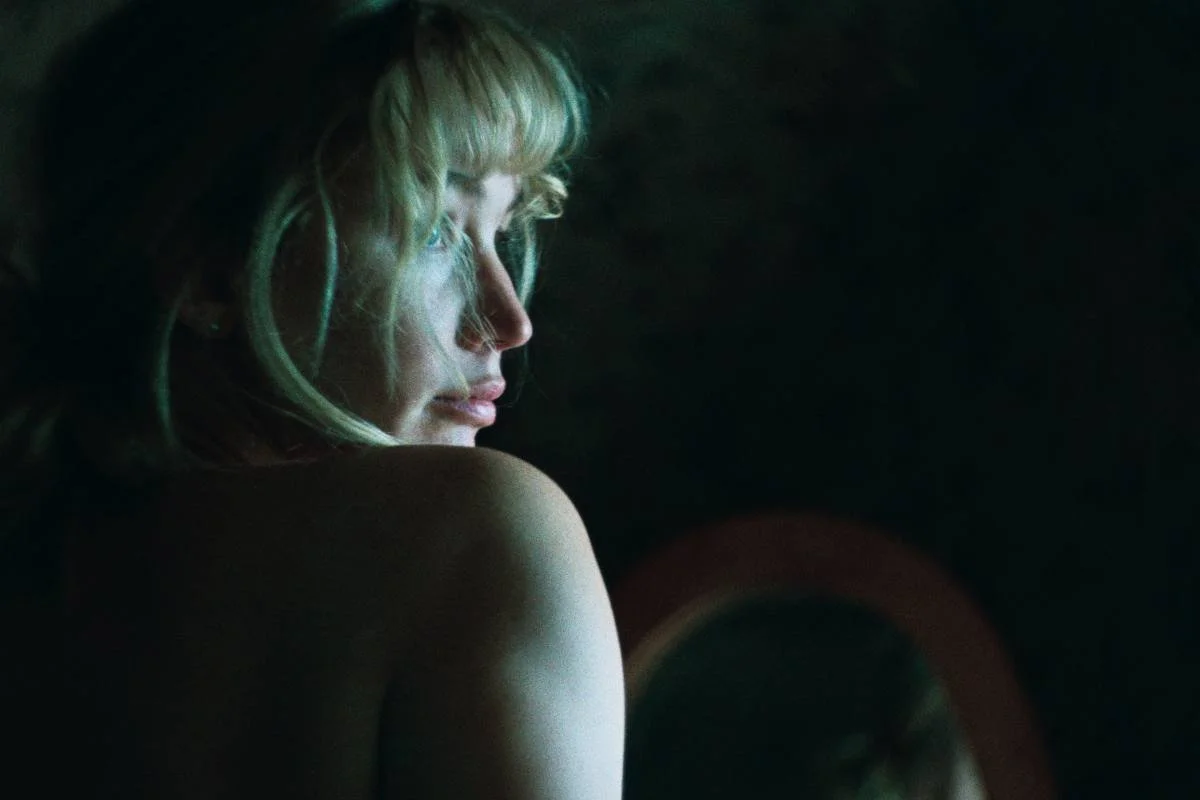Die My Love
Nothing validates my childfree existence quite like a Lynne Ramsay psychodramedy about the chaos and mental violence that can ensue after having a baby. The Scottish director – who previously waded in these waters with We Need to Talk About Kevin – this time explores a postpartum nightmare from a more internal perspective, trading a mass murderer child for the isolation of Montana and a young woman whose identity and creative purpose have essentially been put in a blender and set to pulse. But it’s not all doom and gloom; Die My Love is also, at times, a “bonkers crazy love story” (as Ramsay puts it) that crawls animalistically through fields, claws at vintage wallpaper and wants to fuck all the time. This is not Rhyme Time at your local library. This is Armageddon.
At its centre is Grace (Jennifer Lawrence), a young author who has just moved from New York to rural Montana with her partner Jackson (Robert Pattinson) because he’s inherited his uncle’s house. The couple got it for a good price because the uncle shot himself inside (in an unexpected body part, I might add) and while that may not bode well for pastoral life, it does for their financial future. After all, the housing crisis doesn’t care that you’re pregnant and neither does anyone else, except perhaps for Jackson’s mum Pam (Sissy Spacek) and dad Harry (Nick Nolte), who has dementia and unfortunately won’t make it to grandadhood. A shame, considering he and Grace have a wholesome relationship.
In this charming fixer-upper, Grace and Jackson begin their life as parents. It’s a boy, but he doesn’t have a name and he won’t get one for the entirety of the film. Flashbacks show the couple’s fiery, passionate pre-baby relationship but now they drink beers on the porch and argue about Grace’s housework shortcomings. She’s very quickly tired of Jackson’s FIFO life (or the Montana equivalent of ‘life on the road’) and his absence only amplifies the isolation she feels living so far from civilization. Her village of support is a woman with a shotgun who sleepwalks (Pam) and who herself is struggling to adjust to life without her man. To add insult to psychological injury, Grace notices new and changing condom packets in Jackson’s glove box each time he returns from work.
For Grace the issue is not just postpartum depression (and possibly psychosis); she’s creatively blocked and she can’t get any writing done to pass the time while her baby sleeps. Her favourite hobbies are listening to Toni Basil’s ‘Mickey’ on repeat, walking around with a kitchen knife, masturbating in the woods and tracking down the mysterious motorcyclist who’s been riding past her house. As her mood swings become more extreme and her behaviour becomes more erratic, it’s clear that the image of motherhood society may’ve sold to Grace is a big ol’ case of misrepresentation.
Co-written by Ramsay, Enda Walsh (Small Things Like These and the wonderfully disconcerting The House) and British playwright Alice Birch, Die My Love is based on the 2012 novel by Ariana Harwicz. The story of its adaptation is now pretty well-circulated but in case you don’t know it, Martin Scorsese read it in his book club and sent it to Lawrence’s production company Excellent Cadaver with Lawrence in mind for the lead. Lawrence then sent the book to Ramsay and she signed on as director and co-writer, thus illustrating the power of a good recommendation. The setting of rural France was swapped for Montana and works tremendously, especially when considering the fact that American maternity leave is nonexistent despite it being a country that claims to love babies so much. And I think that’s where the film’s palpable anger comes from.
It’s this anger that I like most about it and that will no doubt turn some viewers off. In that regard, watching Die My Love is a similar experience to watching Darren Aronofsky’s mother! (also starring Lawrence) but without the more obvious metaphors and Biblical themes bashing you over the head. While I’m one of the few people who actually enjoyed mother! I was still relieved to find that the Jennifer Lawrence we see here – despite going through some serious mental health problems – has far more agency than her character in Aronofsky’s film. She acts out whenever she can, both physically and with barbed words.
In one of the film’s lighter scenes, Grace is stuck talking to a vapid idiot at a party who asks when she’s having another. She jokes that she’s currently pregnant and cooking up twins before taking a big sip of wine. The idiot doesn’t read the room and continues to give her unwarranted takes on how hard motherhood is in the first year postpartum.
“I don’t think anyone talks about that enough,” says the idiot.
“It’s all anyone talks about,” says Grace with a deadpan expression and disdain seeping out of her pores. She proceeds, in true Skyler White fashion, to jump fully clothed into the host’s pool. Poor old Jackson is embawwassed and it’s the first time I’ve wanted to punch Robert Pattinson.
On the subject of taking sides, I have to concur with the raves over Jennifer Lawrence’s performance here. She’s incredible and it truly is a fearless performance, no doubt enriched in hindsight by the fact that she was pregnant with her second child while filming and experienced postpartum depression after the birth. While there’s little space for the spotlight to shine on anyone else in the film, Sissy Spacek is gorgeous as Pam, the only person who remotely understands what Grace is going through and who never judges her for not conforming to society’s coo-ing expectations of how a mother should act. And despite his character being frustrating at times (why the fuck would you get a new mother a yappy little dog?) Robert Pattinson has phenomenal chemistry with Lawrence and ensures that we still feel empathy for Jackson, a man who clearly loves his partner but is wildly out of his depth in understanding how to help her.
My one gripe with Die My Love is the muddiness of what it’s trying to say. Ramsay insists that “this whole postpartum thing is just bullshit. It’s not about that. It’s about a relationship breaking down, it’s about love breaking down, and sex breaking down after having a baby. And it’s also about a creative block.” The thing is, it kinda is about postpartum depression because we’re experiencing all these breakdowns from Grace’s depressive, manic perspective – and Grace seems like a rather unreliable narrator. This leads me to be a bit unsure about the ending, so while its imagery is striking, its impact is more ‘huh?’ than ‘woah’.
Overall though, Die My Love is a conversation starter and an explosive one at that. Some may be uncomfortable with its depictions of a disturbed experience of motherhood, and to that I say ‘good’.
Verdict
☆☆☆☆
Die My Love is in cinemas now. Get a sitter.




